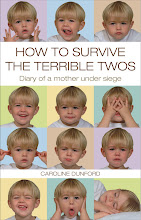I used to think I was absolutely mad. Now I know creative, imaginative children with other things on their mind (like exams or bullying) are particularly sensitive to these kind of end of the world fears. And Wednesday's switch on of the little big bang machine had even the most dull and unimaginative child in my son's school playground asking their mum's if the world was going to end.
But c'mon it was a great story. It made physics almost 'sexy' for a short period of time and after we'd spent so much money on the project (UK contribution around £500M) surely the press should play up the story a bit?
Well, no, I don't think so. And neither did one little girl in India, who was so scared she killed herself. The story I draw this from in the BBC counts numerous examples of children being afraid and parents, who have very little knowledge of physics having to counter alarmist fears raised by the press in general.
And besides the catastrophic fear was of the creation of run away black holes - there was no way on earth (or beyond it) for that matter that this could happen on Wednesday. This was only a test of beams running in a single direction. The actual high speed collisions will be happening next year after the machine is shut down for the winter for calibration. So, the press, always knew there was absolutely no danger of the world ending on Wednesday.
But if I step away for a moment from my rant against irresponsible journalism, I want to raise the point that children's literature and children's movies are growing increasingly dark. There's a school of thought that says as long as there is a good outcome children will put up with a lot of darkness before they get to the light. And yes, story is about conflict, obstacles - and usually the killing off of parents, so publishers won't be seen to condone children doing dangerous things. (If they're orphans there's no one looking after them and they don't know any better. Honestly. If you don't believe me, do a mental check of modern children's lit and see how many popular, adventuring little heros or heroines actually have parents!)
I think in many ways it's true that children are resilient to darkness. They like to see the heros battle the odds. But we're going a little further than that. In the finale of last season's Dr Who (and yes, this show is supposedly suitable for children) a father tried to protect his family (mother and child) by ordering them back into their house away from the daleks. The daleks line up and burn the house out. Now, Dr Who has always been about death. There's often the implication that tons of families are dying off screen, but it's not focussed in on.
And that's the key in any story, whatever the medium, all children can adore a struggle until it comes too close to home. When they start to imagine that it could affect them in their world, when they over-identify, then that's when we're hitting too hard.
Children can tell the difference between story and reality, but they can be overwhelmed by fictional misfortune and driven to total despair by irresponsible reporting. There are some lessons we want children to learn (for example) about the evils of war and violence, but no one learns anything when they're being frightened witless.







2 comments:
Absent parents are pretty much de rigeuer in children's list, it seems. Even if they're still alive, they're absent in some way - either physically or emotionally. Seems to be part of the hero's progress, if John Campbell is to be believed.
I do understand the whole separating yourself from your family to establish your identity theme, but most children you read these books do have families - and there is a whole thing about not being seen to condone children doing dangerous things. If you whisk away the parents it's suddenly alright - which I think is the most stupid idea ever. While I don't expect a children's adventure story in which Granny goes too (although that's a challenge to some writer out there), I do think it is possible to be heroic and have a family with parents and siblings - possibly even a happy family!
Post a Comment